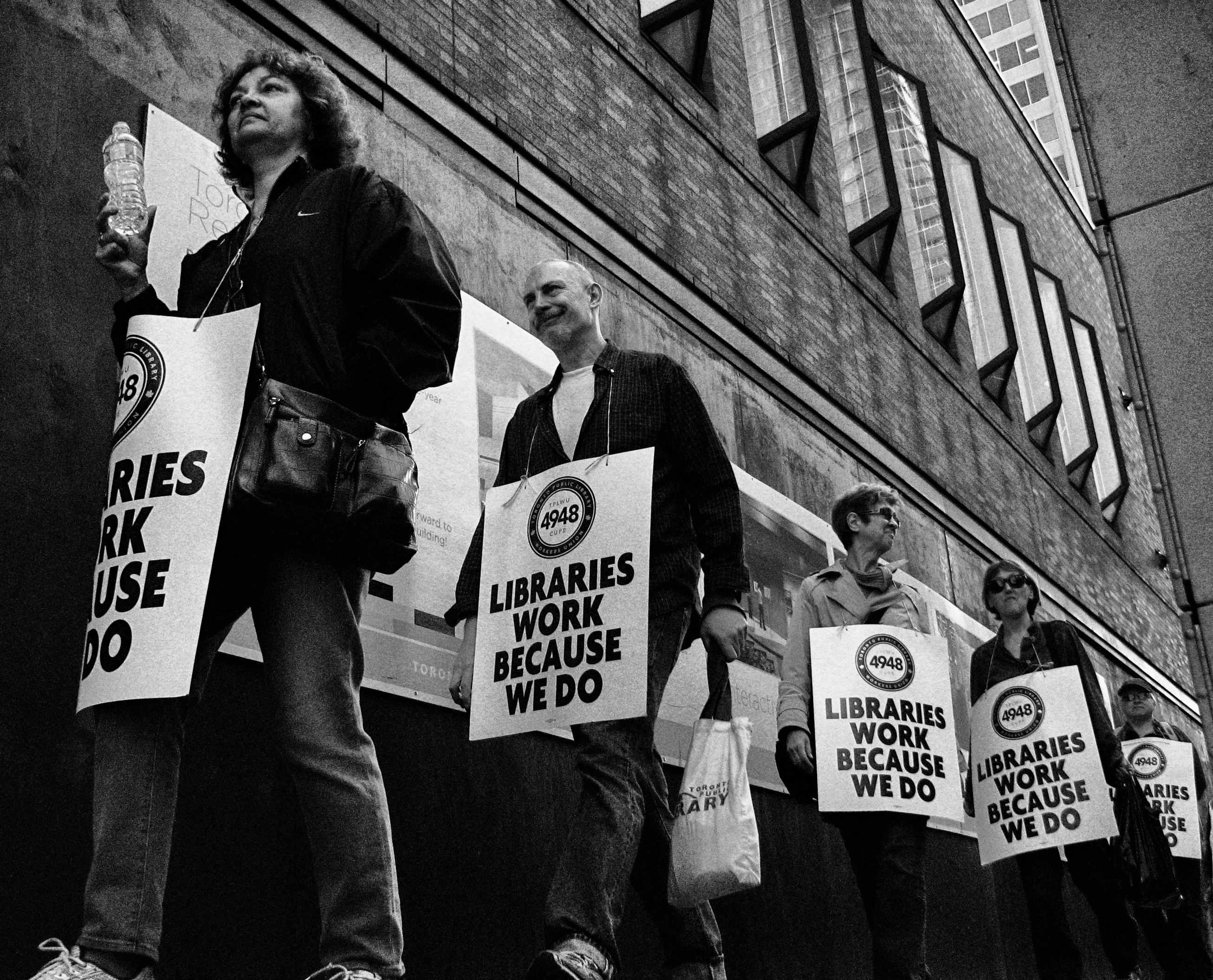When the City demanded that CUPE Local 4948 agree to a provision that only permanent workers with 15 or more years of experience would be exempt from being laid off due to technological changes or outsourcing, it was asking too much.
Earlier, Local 416 had agreed to the provision because 15 years experience covered 70 per cent of their members.
But only a third of library workers have worked that long, leaving the rest at risk of losing their jobs.
“When our union agreed to accept a provision that would cover 70 per cent of our members, management balked at it,” said Jonathon Hodge, a librarian in the Canadiana Room at North York Central Library.
“And that’s why we’re on the streets.”
In a Toronto poll that CUPE commissioned last week, two-thirds of Torontonians agreed that it was a good idea for library workers to strike over job security.
Under the old collective bargaining agreement, all permanent workers were guaranteed jobs in the event their position was eliminated due to technological change or outsourcing.
Hodge, one of the picket captains at City Hall, said, “There’s no obvious reason why they would want to be able to arbitrarily get rid of people unless at some point down the road (they want to) shrink the size of the organization by cutting a chunk of staff, closing branches and selling off the buildings and land.”
If the City gets its way, Hodge said, “Torontonians will see a dramatic decline in the quality of service they enjoy at their libraries.”
Right now, most Torontonians can walk to their local library and speak to a knowledgeable staff person who can take the time to spend with them.
A major layoff and restructuring would result in fewer branches and less services.
“Which means if you’re a student who needs some help with a research direction, you’re not going to get it,” said Hodge, “whereas right now a student can get fifteen minutes of a professional librarian’s time.”
After seven years, Hodge still works part-time for the library. He’s occasionally had temporary full time assignments. But those assignments never turned into a permanent full time job.
Hodge’s situation is typical. These days, a library worker has to expect at least seven to ten years of part-time work before being offered a permanent full time job.
On his first job, Hodge was guaranteed 14 hours a week of paid work. Then he got a job that guaranteed him 17.5 hours a week, before finally landing in his current position which gives him 21 hours a week.
Every job has a different minimum number of guaranteed hours.
“Sometimes you can get relief (extra) hours at other branches,” he said. “But there’s no guarantee and for the last year because of this budget fight nobody has been getting relief hours.”
So that puts part timers in a difficult position. It’s impossible for clerical staff to survive on part time hours. Yet if they don’t stick it out, they’ll never be offered permanent full time employment.
“A lot of the part timers in the non-professional classifications need to find other part time work because their wages aren’t that great,” he said.
“And then you’re constantly juggling two different employers and two different schedules. Then throw in childcare if you’re a parent.”
Part timers also have to pay for their benefits. Hodge pays $220 a month to get extended medical coverage because he has a wife and a child at home.
With a professional job and a family, he considers it a worthwhile expense. But most part time non-professionals can’t afford the coverage. So they forgo the benefit and hope they stay healthy.
As far as pensions are concerned, an individual has to work a certain number of hours over a two year period in order to be invited into the plan.
Without the relief hours or temporary full time assignments, they’ll never work enough hours to qualify.
“There are people in their 40’s who haven’t been invited in yet,” said Hodge, who got lucky and made it into the plan after two years with the library.
If the union doesn’t manage to hold on to the job security provision, it could result in many part time library workers opting for other careers.
Even though Hodge said librarians make a good wage in Toronto, the 40-year-old has his one and a half year old baby and a wife to think about.
“What if I get laid off in a year?” asked Hodge. “I’ve been here for seven years reading books to kids. You think a company down the street is going to hire me. Not likely.”
So he and his co-workers are in a tight spot.
Do they continue with the library, praying they don’t get laid off and one day secure full time employment? Or do they leave and retrain for a new career?
For the last few years, the library has introduced technological change that’s resulted in a couple of dozen clerical job losses across the system.
“They’re intending to do self-checkouts for the entire system and that’s going to mean the elimination of jobs in every branch,” he said.
“So you’re going to get what is a lot more like some retail stores where you can never find anyone for help.”



